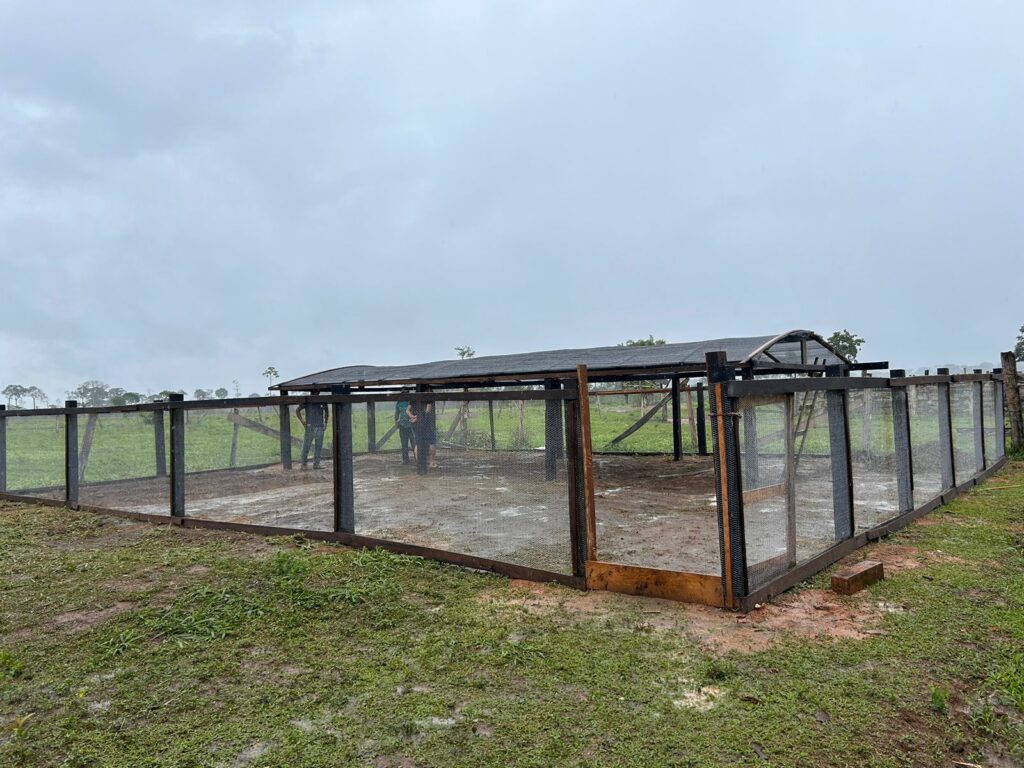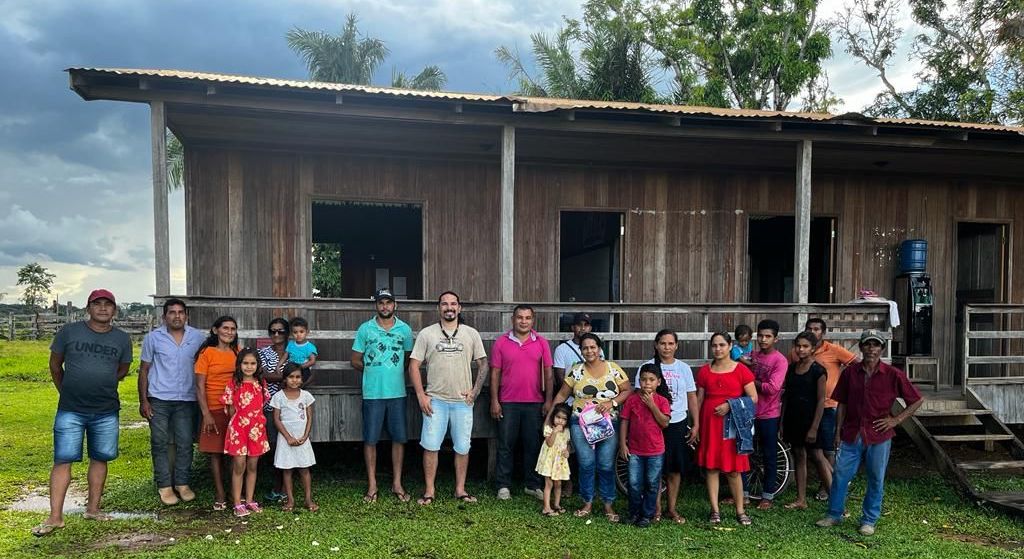Uncover the innovative connections between mathematics and nutrition in an award-winning project led by Kukuy Apurinã. In partnership with Meli, the young visionary demonstrates that it’s time to cultivate connections between knowledge, tradition, and nourishment in the Brazilian Amazon.
Author: Ivi Pauli
Leia em Português
Have you ever imagined the power that lies in the combination of cultivating fresh food in a community school garden and the intriguing universe of mathematics in the pulsating heart of the Brazilian Amazon? Awarded at the State Mathematics Fair of Acre, Kukuy’s innovative project, “Geometry and Proportionality in the Cultivation of the School Garden in Kamapã Village,” developed in collaboration with his Apurinã people and the Meli Network, aims to revitalize the teaching of traditional indigenous mathematics while enhancing the school meals at São Miguel School.
“Every time I passed by there, returning from my village to be in the city for studying, I felt an urge to help. So one day, I stopped there, and we held a workshop where the chief and the teacher told me that the people were suffering from diabetes, and the water was scarce and polluted by the agricultural activities of neighboring lands. We agreed that a school garden with a well would be an excellent start, a meeting point for the community to strengthen itself and begin building a more promising future.”
Kukuy Apurinã
Choosing a full degree in mathematics, Kukuy discovered the fascinating field of ethnomathematics and went far beyond traditional formulas. Aware of the importance of integrating local and traditional knowledge into the discipline to promote cultural diversity, Kukuy plans to share his modeling with teachers. This initiative aims to provide a solid foundation for understanding concepts such as geometry, proportionality, and statistics that will be applied in the planning, construction, and maintenance of the garden. Focused on community and local development, the methodology involves the active participation of students, teachers, families, and indigenous leaders from construction to technical supervision and financial project management.
Now in the implementation phase, the adherence to the pilot project is remarkable. The Chief, excited, emphasized the responsibility of the elders to transmit traditional practices, while the teacher sees the garden as an opportunity to provide healthy food to children. The emphasis on transparency reflects a culturally sensitive approach, centered on people, promoting trust and respect. By being accountable to the community and through his daily presence, Kukuy builds a participatory and respectful relationship, aligned with the principles of co-creation and community involvement, highlighting community satisfaction as a measure of success, with positive impacts on the quality of life and mental health of the Apurinã people.

Historically, the region witnessed the formation of large villages during the first rubber cycle in 1905, almost decimated by measles. Contemporary challenges, such as river contamination by pesticides and fires on neighboring farms, impact vegetation and crucial pollinators, such as drones, essential for Brazil nut trees, causing environmental damage.
“The project site is not just land; it is a treasure of knowledge. And this project is not just a garden; it is an attempt to rescue the living history intertwined with the roots of this resilient community.”
Kukuy Apurinã
The Kamapã village was once the guardian of the largest herbarium in Latin America, internationally awarded, facing the sad loss of 70% of this heritage due to fires. Another curiosity is that the village’s name pays homage to two fundamental warriors in indigenous medicine, whose legacy is preserved by the current chief, a grandson of one of them. Kukuy emphasizes that this knowledge of medicinal herbs will be carefully integrated into the surroundings of the garden, playing a crucial role in the project.
Kukuy’s academic journey led him to transcend the boundaries of his community in search of knowledge in urban centers, bringing considerable challenges in balancing his traditional environment with the academic. Despite experiencing moments of setback due to prejudices associated with indigenous peoples, he never considered abandoning his identity or his people. With great determination, Kukuy acknowledges that knowledge carries the ‘power of the pen’ and feels the duty to occupy spaces and contribute to change. In the face of challenges, he maintains conviction in the importance of representing his people, telling their story, and challenging stereotypes.
“Now, more than ever, I feel the responsibility to return to my community and share the knowledge acquired to empower our people. It is time to paddle together, using knowledge from both academia and tradition to occupy the places that rightfully belong to us. It’s time to break stigmas and speak for ourselves, showing that we are capable of achieving great feats and contributing significantly to society.”
Kukuy Apurinã
Inspired by Kukuy’s conviction, the community is committed to revitalizing its history and culture through the school garden, solidifying a deep connection with its ancestral roots. The partnership with Meli provides visibility and an opportunity for collaboration to address challenges. The community organization driven by the project has attracted the interest of the Municipal Education Department of Boca do Acre, ensuring support and improvements in the school. As he prepares for a master’s degree in Mathematics, the young visionary envisions a future driven by the intersection of mathematics and food production, promoting food sovereignty and sustainability. These themes guide his journey, emphasizing the importance of integrating knowledge for a resilient and equitable future for all.
The inspiring stories of leaders like Kukuy Apurinã in Kamapã Village resonate in Meli’s work. In each transformative project, we find the strength of innovation combined with ancestral knowledge, paving the way for a more equitable and sustainable future. This commitment drives our mission to support initiatives that transcend borders, promoting resilience, cultural preservation, and sustainable development in communities around the world.
Your donation can have a positive impact on the world!
Subscribe to receive our Newsletter!
Find us also at Linkedin, Facebook, Twitter or Instagram
www.meli-bees.org
❤️


How has the implementation of school meals impacted the Kamapa Village in the Amazon? Greeting : Telkom University